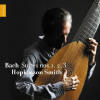Texte paru dans: / Appeared in:
*

GRAMOPHONE (08/2013)
Pour s'abonner /
Subscription information
Naïve
E8937

0822186089378 (ID281)
Reviewer: William Yeoman
Smith
records his Cello Suites transcriptions for theorbo
Hopkinson Smith’s complete recording of JS Bach’s Sonatas and Partitas for
solo violin as transcribed by Smith for 13-course Baroque lute (7/00) has
long been a particular favourite of mine. Finally the New York-born lutenist,
vihuelist and Baroque guitarist tackles Bach’s six Cello Suites, and in this
first volume we hear an increased maturity of thought allied to the
introspection that was always a hallmark of Smith’s playing.
As Smith himself points out, there are numerous ‘beautiful renditions of these works’ currently available as performed on the Baroque lute and the Italian/French theorbo/ chitaronne. Again, among my favourites are Nigel North’s brilliant recordings, on lute, from the mid-1990s, now available as a box-set together with transcriptions of the Sonatas and Partitas. Smith, however, prefers to use an even larger, longer-stringed instrument made after one invented by Bach’s great contemporary and friend, the lutenist and composer Sylvius Leopold Weiss (1687-1750) and which he calls the ‘German’ theorbo.
Bach’s own transcription for lute, or more properly Lautenwerk (lute-harpsichord), of the Fifth Cello Suite stands as, if not a justification for such adaptations, then certainly an unsurpassable exemplum. Thus Smith fills out harmonies here, adds a bass-line there, or completes a polyphonic texture which was merely suggested in the original.
Playing a German theorbo by Joël
van Lennep, Smith generally takes a leisurely approach to tempo. One is thus
able to savour Bach’s writing, Smith’s extrapolations and the wine-dark tone of
the instrument. In the allemandes especially, which seem to inhabit that
penumbra between the prelude and the dance, Smith is at his searchingly
expressive best; but even in the quicker dances he offers a melancholic
ambivalence that is wholly satisfying.
Fermer la fenêtre/Close window
Cliquez l'un ou l'autre
bouton pour découvrir bien d'autres critiques de CD
Click either button for many other reviews


